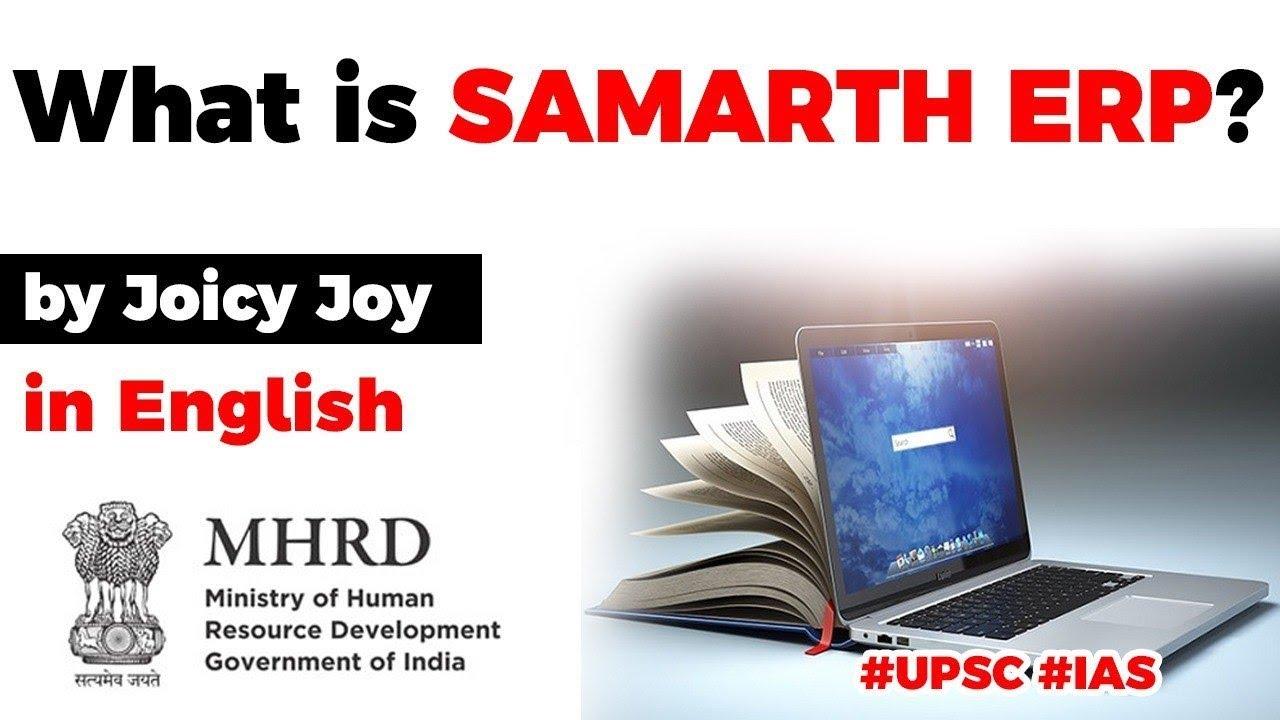Table of Contents
- The Ministry of Human Resource Development (HRD) has developed an e-governance platform ‘SAMARTH Enterprise Resource Planning (ERP)’ under the National Mission of Education in Information and Communication Technology Scheme (NMEICT).
DETAILS
- SAMARTH ERP is an open source, open standard enabled robust, secure, scalable, and evolutionary process automation engine for Universities and Higher Educational Institutions.
- Enterprise Resource Planning (ERP) refers to a type of software used to manage day-to-day business activities such as accounting, procurement, project management, risk management and compliance, and supply chain operations.
- ERP in a University can improve management and administration.
- The platform has been implemented at the National Institute of Technology (NIT), Kurukshetra, a participating unit under the World Bank-supported Technical Education Quality Improvement Program (TEQIP).
- It would automate the processes of the enhancement of productivity through better information management in the institute by seamless access to information and proper utilization of information.
- It caters to faculty, students and staff at a University/Higher Educational Institutions.
National Mission on Education through Information and Communication Technology
- Launched in 2009
- Is a landmark initiative of the Ministry of Human Resource Development (MHRD)
- Objective- Seamlessly provide quality educational content to all the eligible and willing learners in India.
- Envisaged to leverage the potential of ICT, in the teaching and learning process for the benefit of all the learners in Higher Education Institutions.
Initiatives under the Program
- SWAYAM: The Study Webs of Active Learning for Young Aspiring Minds’ (SWAYAM)
- An integrated platform for offering online courses, covering school (9th to 12th) to Postgraduate Level.
- The online courses are being used not only by the students but also by the teachers and non-student learners, in the form of lifelong learning.
- SWAYAM Prabha:
- It is an initiative to provide 32 High Quality Educational Channels through DTH (Direct to Home) across the length and breadth of the country on a 24X7 basis.
- National Digital Library of India (NDL):
- It is a project to develop a framework of virtual repository of learning resources with a single-window search facility.
- Presently, there are more than 3 crore digital resources available through the NDL.
- Spoken Tutorial:
- They are 10-minute long, audio-video tutorials, on open source software
- To improve employment potential of students.
- It is created for self learning, audio dubbed into 22 languages and with the availability of an online version.
- Free and Open Source Software for Education (FOSSEE):
- Project promoting the use of open source software in educational institutions.
- It does that through instructional material, such as spoken tutorials, documentation, such as textbook companions, awareness programmes, such as conferences, training workshops, and internships.
- Virtual Lab:
- This is a project to develop a fully interactive simulation environment to perform experiments, collect data, and answer questions to assess the understanding of the knowledge acquired.
- E-Yantra:
- It is a project for enabling effective education across engineering colleges in India on embedded systems and robotics.
Technical Education Quality Improvement Programme
- Started in 2002 by the Ministry of Human Resources and Development with the assistance of the World Bank and is being implemented in a phased manner .
- It aims to upscale the quality of technical education and enhance capacities of institutions.
- The Technical Education Quality Improvement Programme III (TEQIP-III) was started in 2017 and will be completed by 2021.
- It aims to develop technical education as a key component for improving the quality of Engineering Education.
- Objective- To improve quality and equity in engineering institutions in focus states such as in low income states.
Latest Burning Issues | Free PDF






















 WhatsApp
WhatsApp